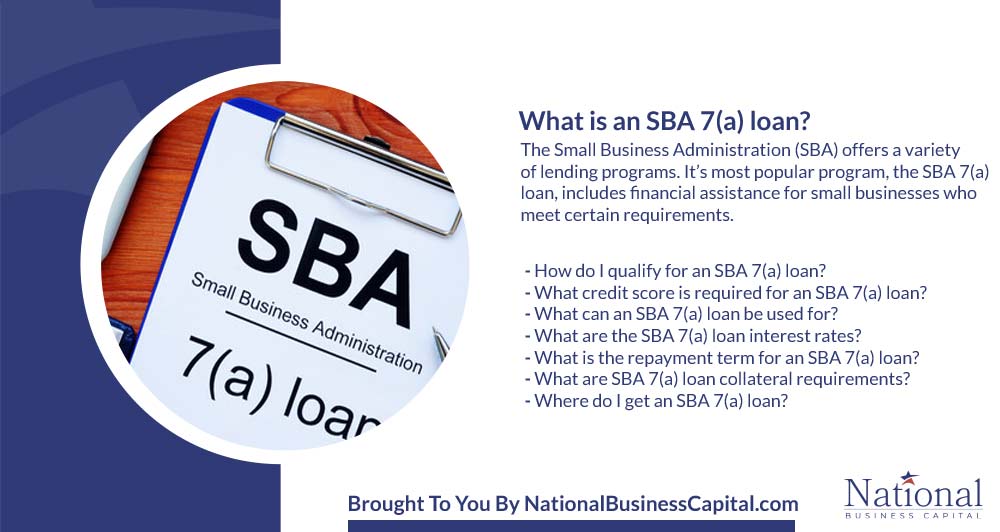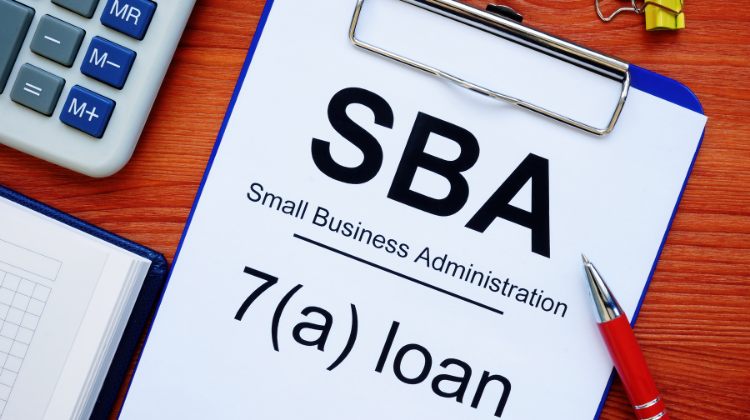
The Small Business Administration (SBA) offers a variety of lending programs. It’s most popular program, the SBA 7a loan, includes financial assistance for small businesses who meet certain requirements.
The SBA 7(a) loan is partially government-backed. This means the government agrees to cover a portion of the loan amount in case borrowers default. This guarantee provides lenders with additional security, which in turn, translates to lower interest rates for you.
The maximum funding amount for SBA 7(a) loans is $5 million and funds may be used for operational expenses, real estate purchases, equipment purchases, or even debt refinancing. The SBA 7(a) loan features some of the lowest interest rates on the market, with repayment periods ranging between 10 to 25 years.
The SBA 7(a) loan can be a great financing solution for small businesses, however, not every business will qualify. The SBA maintains very strict eligibility requirements.

How do I qualify for an SBA 7a loan?
When assessing your application, the SBA will look into what your business does to receive income, your operating location, and the character of ownership. At the very minimum, to qualify for an SBA 7(a) loan your business must:
- Operate for profit
- Be owned (51% or more) by a U.S. citizen or lawful permanent resident
- Meet the SBA’s size standards
- Must be located and operate within the United States
- Have reasonable invested equity
- Not operate in an ineligible industry
- Not be delinquent on any debt obligations to the U.S. government, such as student loans
- Meet character requirements for all owners with 20% or greater ownership – individuals with certain types of criminal histories are prohibited
- Be able to demonstrate a need for the loan
There are some rare exceptions to these requirements. In some cases, a for-profit subsidiary of a non-profit organization may be eligible for an SBA 7(a) loan. Other times, borrowers enrolled in a repayment plan for federal tax debt or federal student loans may qualify.
The SBA will also want to make sure your cash flow is strong enough to repay the loan. The SBA doesn’t rely on collateral as much as other lenders, instead, they expect cash flow to be the primary source of repayment. Businesses should be able to demonstrate projected positive cash flow within a minimum of two years.
You can review the types of documents and financial statements you’ll need to include in your SBA 7(a) loan application here.

What credit score is required for an SBA 7(a) loan?
For the best approval odds, you’ll need to have solid personal and business credit scores. The SBA emphasizes strong credit and may analyze personal credit score data for multiple owners (with 20% shares or more).
The SBA uses the FICO® Small Business Scoring ServiceSM Score (SBSS Score) for SBA 7(a) loan applications. The FICO SBSS is a business credit score that can analyze personal credit data, business credit, as well as other financial information. The FICO SBSS maintains a score range of 0 to 300, and anything below a 155 may hinder approval.
Additionally, SBA lenders may have their own personal credit score requirements. If you’re considering working with a bank or a credit union, personal and business credit scores should be at least 700. However, fintech lenders and online lenders offer more flexibility.
What can an SBA 7(a) loan be used for?
SBA 7(a) loans are working capital loans and that can be put towards a variety of business functions. This includes:
- Inventory, supplies, and raw material purchases
- Operational expenses
- Expansion projects, entailing hiring new staff, advertising, start-up costs, etc.
- Debt refinancing
- Real estate or vacant land purchases
- Real estate renovations
- Certain business acquisitions
An SBA 7(a) loan cannot be used to finance:
- Business expenses in the following industries: speculation, lending, investment, rental real estate, gambling, and nonprofit
- Delinquent tax payments
- Relocations that will result in net job losses
- Rental property purchases where your business doesn’t occupy at least 51% of the space in an existing property or 60% of the space in a new construction.
What are the SBA 7(a) loan interest rates?
SBA 7(a) loans feature some of the most competitive interest rates on the market – if you can qualify for funding. Interest rates for SBA 7(a) loans typically start at 6% and range to 8%. While participating lenders have some room to negotiate, they can’t exceed the SBA’s maximum limit. Plus default rates aren’t allowed, so borrowers won’t have to worry about rate hikes if they miss a payment.
What are the SBA 7(a) loan fees?
Like all lending products, SBA 7(a) loans are subject to certain fees. However, the SBA limits the amount of fees lenders can impose on borrowers. As a result, many small business owners typically save with SBA 7(a) loans compared to other lending products.
The SBA caps loan packaging fees at 3% on loans of $50,000 or less; 2% for loans up to $1,000,000, and 0.25% on the portion over $1,000,000 – with an absolute maximum of $30,000.
Late fees have a limit of 5% and only apply if a borrower is more than 10 days late on a
payment. The SBA also has to approve all servicing fees in advance and borrower legal fees are also limited. The SBA forbids origination fees, broker fees, and renewal fees.
What is the repayment term for an SBA 7(a) loan?
SBA 7(a) loan repayment periods range between 10 to 25 years. The SBA will need to know how you plan to use the funds and impose repayment periods accordingly. Generally, the SBA insists on the shortest repayment period possible, depending on your project and finances.
The SBA typically insists on the following loan repayment terms:
- Working capital: up to 10 years
- Equipment purchases or fixtured: between 10 to 15 years
- Leasehold improvements: up to 10 years with a possible extension of another 12 months
- Real estate purchases or renovations: up to 25 years
- Mixed purpose loans: case-by-case basis
What are SBA 7(a) loan collateral requirements?
SBA 7(a) small loans up to $25,000 or less do not require collateral. However, for loans greater than this amount, the SBA will insist you pledge collateral if you own assets of value. This includes business assets as well as personal assets.
In some cases, any business owner with 20% or more shares may be required to put up their personal real estate (unless they own less than 25% of equity in the real estate property). Other times, personal guarantees may be required. Spouses may also have to sign a personal guarantee when the combined interest of the couple and children equates to 20% or more.
Owners of businesses with one year or less of history, such as startups, will have to contribute at least 10% of their own funds as an “equity injection”.
Where do I get an SBA 7a loan?
You can apply for an SBA 7(a) loan through participating lenders. These include banks, some credit unions, online lenders, fintech lenders, and other financial institutions. Participating lenders must be vetted by the SBA beforehand to ensure they’re following the designated guidelines.
Ultimately, the decision of whether to approve your SBA 7(a) loan application or not depends on the lender. Lenders are free to impose their own requirements, so long as they don’t conflict with SBA guidelines. Some lenders, such as Preferred Lending Partners (PLPs) even have the authority to underwrite SBA loans and make credit decisions without the SBA’s approval.
Banks are known to have more rigid requirements and many businesses find it difficult to secure funding from them. Other lenders, such as online lenders or fintech companies, can be more flexible.
If you’re considering taking out a SBA 7(a) loan for your small business, you may benefit from reviewing multiple offers from different lenders. In that case, make sure to use National – an fintech marketplace that connects businesses with financing opportunities.
National works with different SBA lenders to help small businesses secure the funds they need at the lowest rates and ideal repayment terms. And while most SBA 7(a) loan applications require boatloads of paperwork and can be time-consuming – National works to expedite and simplify the process.
Other lenders can take up to 8 months to approve your application and release funds – National can get it done in as little as 45 days. Plus, our team of expert Business Financing Advisors work with you every step of the way. In some cases, they even be able to help you get a SBA 7(a) loan with a tax lien.
Ready to get started?
Learn more about how your business could qualify for a SBA 7(a) loan and other financing solutions.
National Business Capital is the top FinTech marketplace offering small business loans and financing. Harnessing the power of leading technology and smart people, we’ve streamlined the application process to secure over $1 Billion in financing for business owners nationwide.
Our Business Financing Experts work within our 75+ Lender platform to match you with the right option. Easily access the best low-interest SBA loans, short and long-term loans, business lines of credit and equipment financing all in one place.
We strengthen local communities one small business loan at a time. For every deal we fund, we donate 10 meals to Feeding America!